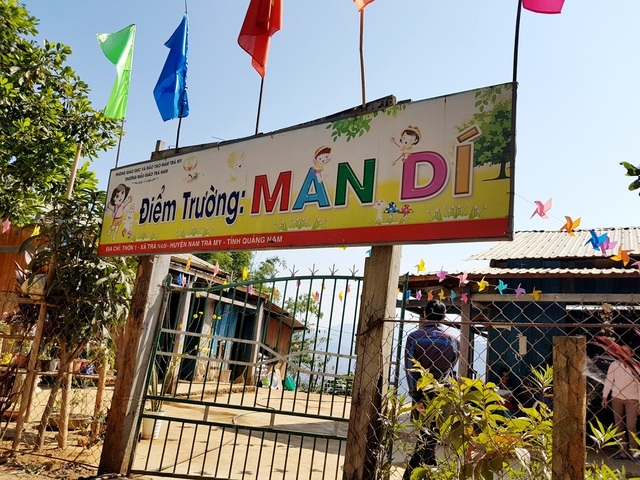 |
|
Man Di School Site
|
Each commune in the mountainous area of Nam Tra My District has a primary or secondary ethnic boarding school site since the mountain population are spread out. Some communes have dozens of school sites that are far away from each other.
Tra Tap Primary School Site is only 5-7km away from the district's centre so students and their parents can go to school by motorbike or car. But many of the school sites are located in remote areas that the students have to walk in the mountain for hours during good days. When there are storms, the paths are cut off by floodwater.
The students often have to go to school either from early Monday morning or late Sunday afternoon to reach boarding schools and return home on Friday. The students and teachers at Man Di School Site also said they often take three hours to walk a 5-7km to and from school because of the mountainous terrain.
Nguyen Tran Vy from Nam Tra My District Department of Education and Training said walking for hours to and from school was normal for people there. The students and teachers at Ong Vanh School Site have to walk 8 hours if they want to go to the main school of Tra Don Ethnic Boarding School.
"That's when the weather is good. They'll have to take shelter at local houses and it can take two days to the main school if there are storms," he said.
Vo Dang Thuan, head of Nam Tra My Department of Education and Training said third graders and younger students must stay at boarding schools. They can't open classes for older students at mountainous villages yet because of problems with teaching foreign languages and computers.
Starting from 2019-2020 school year, the students from third grades and older must study at schools in the communal centre. This is also one of the reasons why the students from mountainous areas must walk more than others.
"A teacher can't teach just one or three students alone. If the students didn't walk to communal schools, we'll have to hold the classes in some villages anyway. They also can't attend foreign language or computer classes," he said. "Going to communal schools will improve learning and teaching quality." Dtinews

Vocational schools, colleges expect 80 percent of graduates to find jobs
More than 80 percent of graduates at most colleges and vocational training schools in HCM City this year have found jobs, according to the city’s Department of Labour, Invalids and Social Affairs.

HCM City strives for “smart” schools
The HCM City educational sector plans to enhance the application of IT in management, teaching, testing, and student assessment, according to Le Thanh Liem, vice chairman of the city People’s Committee.
 Students at a mountainous district in Quang Nam Province have a long walk to school because of difficult terrain.
Students at a mountainous district in Quang Nam Province have a long walk to school because of difficult terrain.